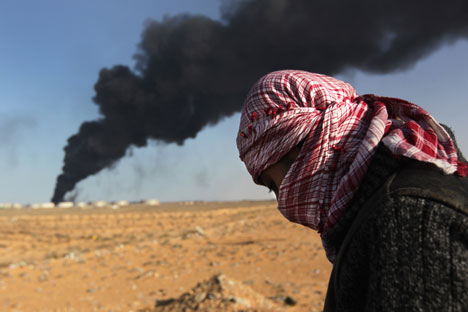
The Syrian issue requires a political solution. Source: Getty images / Fotobank
India has not publicly backed Russian military intervention against IS terrorists in Syria but, during his ‘private’ dinner with President Vladimir Putin on Wednesday, Prime Minister Narendra Modi will offer India’s unstinted support for the Russian action being taken against terrorists who have ravaged Syria and Iraq.
“In our minds, the issue is quite clear,” said Indian Foreign Secretary Subrahmanyam Jaishankar, that there is support for Russia’s aerial intervention in Syria, when he was asked about India’s position on Russian airstrikes.
“We are on the same page, in broad terms,” he said. “In terms of what they are doing inside Syria, it is between Russia and the Syrian government,” he said.
“The Syrian issue requires a political solution,” Jaishankar said after a media briefing on Prime Minister Modi’s first bilateral visit to Russia. “At a conceptual level, Russia and India agree that the Syrian crisis needs to be resolved through intra-Syrian dialogue.”
“Russia has a longstanding position regarding terrorism, which we share. Their action is related to their long held beliefs, many of which we also share,” said Jaishankar, adding, “We certainly don’t want forces of religious fundamentalism to gain ground.”
Sources in the Indian government told RIR that India would not, however, be part of any military action in Syria or any part of West Asia unless it was a consensual coalition against terrorist forces, under a United Nations flag.
Although not a member or observer of the International Support group for Syria, India has been closely monitoring the deliberations there and is quietly hopeful that a consensus will be forged on tackling the issue of terrorists in West Asia.
There is an immediate concern for India, too, as IS tentacles are creeping into the immediate neighbourhood, gaining a toe-hold in Afghanistan and even Pakistan. Some Indians have recently been arrested for being affiliated to the Islamic State.
On his way back from Moscow, Modi is due to briefly visit Kabul, to formally hand over the newly-constructed Parliament building, which India has built.
Closer and more intensified anti-terrorism cooperation, with enhanced intelligence-sharing and even the possibility of combined operations against terrorist groups in the region (from Afghanistan to Central Asia) is a major item on the agenda for Modi and Putin.
Both men have strong nationalist inclinations and are clear they will not compromise on security issues and wiping out terrorism. They conferred on this issue during the G-20 summit in Antalya in November, held in the aftermath of the Paris terrorist attacks, and there is likely to be a more coordinated front against terrorism at international forums.
During his visit to New Delhi earlier this month, Dmitry Rogozin, Russian Deputy Prime Minister, emphasized the joint thinking on this crucial issue.
"The Indian Prime Minister is going to visit Moscow at a very important and troublesome period of time. It is not surprising that everything we discussed in New Delhi largely concerned struggle against terrorism and radical forms of Islam... India has enormous, and even dramatic, experience in waging this struggle," Rogozin told TASS news agency.
Commenting on the special relevance of the Prime Minister’s visit Rogozin said, “The visit will have a deep meaning. It is extremely important for discussing joint actions and the creation of a broad counter-terrorism coalition and also for exerting joint efforts in conditions when the two countries have not only found themselves on the one side of the barricades but are in the vanguard of this struggle (against terrorism)," said Rogozin.
The presence of IS in Afghanistan has aggravated the situation even further. "The Taliban used to be perceived as an exclusively domestic phenomenon for Afghanistan. ISIS (or IS) is something absolutely the opposite. They are as radical or even more radical (than the Taliban), and they also have global ambitions," Rogozin said, stressing the need for closely coordinated positions.
The cosy, fireside chat before dinner at the Russian President’s ‘dacha’ will spell out clearly the kind of coordination the two leaders seek. The presence of Ajit Doval, India’s National Security Adviser, and Nikolai Patrushev, President Putin’s chief NSA will further strengthen the tenor and the substance of the anti-terrorism cooperation.
Security and anti-terror cooperation make up a significant part of the special and privileged strategic partnership the two countries share, with defence and energy security also a significant segment. Other deliverables from the visit will be in terms of raising the economic aspect of the relationship, by rolling out a string of measures from an easier business and official visa regime to significant investment proposals and tourism boosters, sources said.
All rights reserved by Rossiyskaya Gazeta.
Subscribe
to our newsletter!
Get the week's best stories straight to your inbox